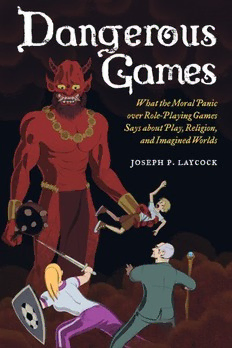
Dangerous Games: What the Moral Panic over Role-Playing Games Says about Play, Religion, and Imagined Worlds PDF
Preview Dangerous Games: What the Moral Panic over Role-Playing Games Says about Play, Religion, and Imagined Worlds
Dangerous Games This page intentionally left blank Dangerous Games What the Moral Panic over Role-Playing Games Says about Play, Religion, and Imagined Worlds Joseph P. Laycock university of california press University of California Press, one of the most distinguished university presses in the United States, enriches lives around the world by advancing scholarship in the humanities, social sciences, and natural sciences. Its activities are supported by the UC Press Foundation and by philanthropic contributions from individuals and institutions. For more information, visit www.ucpress.edu. University of California Press Oakland, California © 2015 by The Regents of the University of California Library of Congress Cataloging-in-Publication Data Laycock, Joseph. Dangerous games : what the moral panic over role-playing games says about play, religion, and imagined worlds / Joseph P. Laycock. p. cm. Includes bibliographical references and index. isbn 978-0-520-28491-3 (cloth, alk. paper) isbn 978-0-520-28492-0 (pbk., alk. paper) isbn 978-0-520-96056-5 (electronic) 1. Fantasy games—Moral and ethical aspects. 2. Role playing—Moral and ethical aspects. 3. Dungeons and Dragons (Game—Moral and ethical aspects. I. Title. gv1469.6.l395 2015 793.93—dc23 2014030653 Manufactured in the United States of America 24 23 22 21 20 19 18 17 16 15 10 9 8 7 6 5 4 3 2 1 In keeping with a commitment to support environmentally responsible and sustainable printing practices, UC Press has printed this book on Natures Natural, a fi ber that contains 30% post-consumer waste and meets the minimum requirements of ansi/niso z39.48-1992 (r 1997) (Permanence of Paper). For the bard who found me in the tavern and joined my party. This page intentionally left blank Contents Preface. “You Worship Gods from Books!” ix Introduction. Fantasy and Reality 1 part i. the history of the panic 1. The Birth of Fantasy Role-Playing Games 31 2. Dungeons & Dragons as Religious Phenomenon 51 3. Pathways into Madness: 1979–1982 76 4. Satanic Panic: 1982–1991 101 5. A World of Darkness: 1991–2001 137 part ii. interpreting the panic 6. How Role-Playing Games Create Meaning 179 7. How the Imagination Became Dangerous 210 8. Rival Fantasies 241 Conclusion. Walking between Worlds 279 Notes 291 Bibliography 333 Index 345 This page intentionally left blank Preface “You Worship Gods from Books!” My tolerance of this event is not advocacy for all of its content, and those who wish to interpret my remarks in this way do so uncharitably. And if pushed on this, I swear, I will blame the whole thing on Dungeons & Dragons anyway. The 80s tried to beat into my head that my beloved hobby was a gateway to darkness, and lo and behold, here I am. I must have failed a saving throw somewhere along the way. — Harvard lecturer in ethics and public policy Christopher Robichaud, “Remarks on the Occasion of Harvard’s Reenactment of the Black Mass” When Gary Gygax and Dave Arneson published Dungeons & Dragons (D&D) in 1974, they created the fi rst commercially successful fantasy role-playing game. In these games, players imagine heroic characters for themselves and produce narratives of their adventures. The point is not only to produce a good story but to allow the players to experience an imagined world together. As an art form, the fantasy role-playing game is directed inward. The players do not perform their roles for an audi- ence but for each other. Because of this introspective quality fantasy role-playing games are almost impossible to appreciate or critique with- out participant observation. This is no doubt why, within the small body of scholarly research on these games, I am unaware of any exam- ple in which the scholar has not spent hours playing these games him- or herself. The present study is no exception. I grew up in Austin, Texas. I was introduced to D&D at the age of six at (where else?) a summer camp for gifted children. In those days, children were allowed to spend the afternoon wandering through the ix
